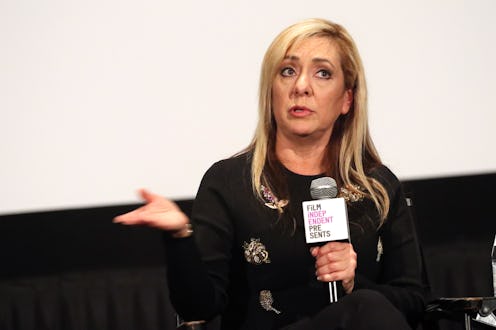Entertainment
Why 'Lorena' Is The Perfect Story For A #MeToo Era, According To Lorena Bobbitt

*Warning, this post contains details about sexual assault.
In 1993, Lorena and John Wayne Bobbitt made headlines when Lorena cut off her husband's penis, left their house with the organ, and threw it out her car window into a grassy field for it to later be retrieved by medical professionals and surgically reattached onto John Wayne's body. The lurid and sensationalized case became a punchline on late-night shows, a slogan on town t-shirts; headlines called Lorena a "Latina hothead," and many said that she committed the ultimate act of aggression toward a man. But the story that Amazon's new docuseries Lorena tells is darker and more serious than the media suggested in 1993. It's a story, that when being told today through the lens of a #MeToo era, will hopefully not only spotlight alleged abuse, but listen to Lorena Bobbitt as an alleged survivor and not the villain.
Lorena, sitting in a hotel lobby while attending the 2019 Sundance Film Festival — where the docuseries premiered in January — says she was hesitant when director Joshua Rofé first came to her about the series. "The issues people wanted to discuss [in the past] focused on [John Wayne Bobbitt]," she says. "[The stories focused] on his organ and the act, instead of actually reevaluating the why — what drew this woman to do this?"
The why, according to the woman herself, is rooted in alleged domestic abuse, marital rape, and suffering. Through video footage from the 1993 trial, viewers will see and hear Lorena Bobbitt, then in her early 20s, graphically detail the alleged abuse and assault her husband put her through during their marriage. John Wayne Bobbitt, who participates in the Amazon series, maintained throughout the trial and subsequent media tour that he never assaulted or raped his wife, and still maintains that to this day. He was acquitted by a jury of such charges in 1993. He did say during the trial — as seen in the documentary — that he did push or restrain his then-wife in order to prevent her from hitting him.
After a very publicized journey through the legal system, Lorena Bobbitt was eventually found not guilty of all criminal charges in January 1994, according to The New York Times. She was acquitted for the charge of malicious wounding, as a jury concluded that she was "temporarily insane" when she committed the act the year prior.
Lorena, 25 years later, is now re-shining a light on her story with the help of Rofé and executive producer Jordan Peele, this time to a different audience. While the trauma of the alleged abuse may have been drowned out at the peak of the trial in favor of catchy, pun-filled headlines, Lorena on Amazon calls out the media's mishandling of the story, appealing to those who are either unfamiliar with the case and watching with fresh eyes, or simply were distracted by the jokes every newspaper, talk-show host, and news station made at the time.
"I could turn on the TV and there was news everywhere about me," Lorena says. "I saw how unfair and how sensationalized and lurid it was ... how judgmental people on talk shows were." At the end of the day, however, the treatment Lorena faced a generation ago is what prompted her to take the opportunity to do this project.
"There is not a day that passes that I don't see in the news cases of domestic violence ... within my community, some domestic violence issues don't even make the news," she says of the small town she lives in now — just minutes away from where she and her ex-husband lived in 1993. As time passed — and according to her, it took some time and the love of her family to get there — Lorena felt empowered to use her voice to bring awareness to the issue. "I am an advocate and I talk to women in shelters," she shares, "I see the suffering. I know the pain ... It is the perfect story to bring alive again, and to see through the eyes of the #MeToo movement."
While Lorena Bobbitt's story is not the first, and will likely not be the last time a woman's story is minimized amid a media circus — Lorena refers to cases like those of Anita Hill, Monica Lewinsky, and Marcia Clark — she is hopeful she'll see progress in making sure women and sexual assault and abuse survivors are protected in the future. For her, that means creating stronger legislation and holding politicians responsible to create laws that protect women.
"I see changes — progress — in laws protecting women, but there are still many gaps to be closed," she says. "Politicians get caught in politics, and they're not really aware of this social epidemic against women."
The docuseries subject, who dedicates her time to her 13-year-old-daughter and the Lorena Gallo Foundation, Lorena's Red Wagon, has big plans for the future. She already speaks at schools, facilitates workshops with survivors, and works closely with her community's local police officers, but she would like to lobby to Congress to get federal funding for the school systems to provide a curriculum in schools to talk about domestic violence. "It also starts at home," she says. "I think we honestly need to talk to our children and our parents, as a responsibility. No one deserves to be treated that way." With the docuseries premiering on a major streaming service, out now, the opportunity is absolutely there for parents and partners to have these discussions and hopefully address the way we handle topics like Lorena's.
If you or someone you know is experiencing domestic abuse, call 911 or the National Domestic Violence Hotline at 1(800) 799-SAFE (7233) or visit thehotline.org.